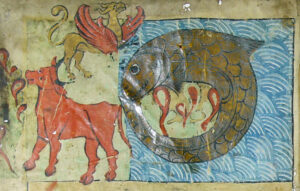An ofan — a liturgical prayer to be inserted into the Shaḥarit qedushah d-yotser — for the first of Elul, the new year for animals. Not as of yet part of a cycle but who knows, maybe a few other parts will be written in days to come!
Note: “The CAUSE” is used to translate the Divine Name YHVH, based on the philosophical idea of God as the Prime Mover and on the interpretation of the Name as a causative form of the copula – “causes to be.” This translation also uses the plural pronouns They/Their/Them to refer to God as a pluralis majestatis, and to avoid the implications of God being assigned a gender. (Find Ibn Ezra’s commentary on Genesis 1:1 for a discussion of the pluralis majestatis when referring to God.)
| Source (Hebrew) | Translation (English) |
|---|---|
צֹנֶ֣ה אֵילִים כְּבָשִׂים וּרְחֵלִים וַאֲלָפִ֣ים בָּקָר שׁוֹר פָּרוֹת וַעֲגָלִים כֻּלָּ֑ם גּוֹעִים לְפָנֶיךָ לְהִנָּתֵן מַאֲכָלִים וְ֝גַ֗ם דָּג וְעוֹף שֶׁעַד־שָׁמַֽיִם עוֹלִים בַּהֲמ֥וֹת הַרְרֵי־אֶֽלֶף יִקְרָא־לְךָ תְּהִלִּים שָׂדָֽי וְכׇל־אֲשֶׁר־בּוֹ לְךָ יוֹדֶה׃ |
Sheep — rams, lambs, and ewes — and herds — cattle, oxen, cows, and heifers — all bleat before You to be given food and so too fish and fowl that ascend to heaven; beasts of the thousand hills calls[1] Purposefully in singular. The phrase “beasts of the thousand hills,” from Psalms 50:10, is said by the rabbis to refer to the primordial Behemoth, whose name is a pluralis majestatis literally meaning “beasts” praises to You; the field[2] Psalms 8:8 and all that is in it thanks You — |
חַיּוֹת הַקֹּֽדֶשׁ עִם־חַיּוֹת הַשָּׂדֶה׃ צִפּ֣וֹר זִיז־שָׂדַי אַף־הוּא לֹא־יַעֲלֶה עַד שָׁ֭מַיִם חַלּוֹנוֹת־אוֹר כִּי־כְּבוֹדְךָ לָעַד וּדְגֵ֣י טֶֽבַע רוֹאִים כִּי חַסְדְּךָ יוּעַד הַיָּ֑ם יִתְגַּעֵשׁ בְּקוֹלְךָ הַמַּרְעִיד רַֽעַד עֹ֝בֵ֗ר כׇּל־מַלְאָךְ אֲשֶׁר־לְשִׁירָה מוּעָד אׇרְח֥וֹת לִכְתֹּת מִמָּקוֹר עַד־יַֽעַד יַמִּֽים מְרוֹמוֹת וְתֵבֵל לִכְבוֹדְךָ כֹּל מוֹדֶה |
The holy animals[3] Usually translated as “living creatures,” this category of angels mentioned in Ezekiel 1 is referred to by the same word as earthly animals. Thus the gist of the entire song! with the animals of the field. The bird Ziz Sadai,[4] The legendary king of all birds, parallel to the behemoth and referenced in the following verse, Psalms 50:11 even it cannot ascend unto heavenly windows of light, for Your glory is eternal; and fish of the abyss[5] In modern Hebrew, this word means “nature” and is a medieval calque from the Arabic ṭabʕ. Here it is meant to reflect the other meaning of this root, “drowning.” see that Your kindness is testified; the sea will storm at Your voice that engenders trembling; passing is each angel who is appointed for song; the ways of the planets from source to goal; the seas,[6] Psalms 8:9 heights, and land. All acknowledge Your glory — |
חַיּוֹת הַקֹּֽדֶשׁ עִם־חַיּוֹת הַשָּׂדֶה׃ יְהֹוָ֥ה נוֹתֵן לְזֶה וְלָזֶה כְּנֶֽגֶד כׇּל־צְרָכָיו אֲדֹנֵ֑ינוּ סוֹעֵד לַכֹּל לִיצוּרָיו וּלְמַלְאָכָיו מָה־עָשִׁיר וּמָה־פּוֹרֶה עוֹלָמְךָ בְּמַעֲרָכָיו אַדִּ֥יר פִּלְאִי הוּא מִי־מָדַד רְחָבָיו וּמִי אֳרָכָיו שִׁ֝מְךָ֗ צוֹפֶה שֵׁם כׇּל־יְצוּר כָּתוּב בִּשְׁנֵי כְּרָכָיו בְּכׇל קְהַל אִישׁ וּבְהֵמָה יִכְרְעוּ כׇּל־בִּרְכָּיו הָאָֽרֶץ רֹאשׁ מְרִימָה כִּי יָהּ מִמַּאֲכֶלֶת פּוֹדֶה׃ |
The holy animals with the animals of the field. The Cause gives to this one and that per all its needs. our Master feeds all Their creatures and Their angels. How rich and fruitful is Your universe in its arrangements! glorious is It, wondrous; who can measure its width or breadth? Your name sees every creature’s name writtten in two volumes;[7] i.e. the book of life and the book of death. Elul is the beginning of the season of repentance and all the world — human, animal, and angel — is said to be judged. in all societies of man and beast, all their knees will bow; the earth[8] Psalms 8:10 raises its head, for Yah redeems from the cleaver — |
חַיּוֹת הַקֹּֽדֶשׁ עִם־חַיּוֹת הַשָּׂדֶה׃ בָּר֥וּךְ שֶׁנָּתַן לָהֶם אֶת־אׇכְלָם בְּעִתּוֹ בְּיָד רָמָה כְּבֹוד־שְׁמוֹ כׇּל־עַֽיִן יִרְאֶה תִּשְׁתַּחֲוֶה כׇּל־קוֹמָה יְהוָ֖ה תְּהַלֵּל כׇּל־חַיָּה אָדָם וּבְהֵמָה מִמְּקֹומֹֽו תִּשָּׁמַע זִמְרָה וְאֶת־שְׁמוֹ תַּעֲדֶה |
The holy animals with the animals of the field. Blessed be who gave them food in their time with a high hand! the glory of Their name every eye will see, every spine will bow the Cause all life praises, man and beast. from Their place[9] Ezekiel 3:12 will hymn be heard, adorning Their name — |
חַיּוֹת הַקֹּֽדֶשׁ עִם־חַיּוֹת הַשָּׂדֶה׃ וְהַחַיּוֹת יְשׁוֹרֵֽרוּ וּכְרוּבִים יְפָאֵֽרוּ וּשְׂרָפִים יָרֹֽנּוּ וְאֶרְאֶלִּים יְבָרֵֽכוּ פְּנֵי כׇּל־חַיָּה וְאוֹפָן וּכְרוּב לְעֻמַּת שְׂרָפִים לְעֻמָּתָם מְשַׁבְּחִים וְאוֹמְרִים — בָּר֥וּךְ כְּבֹוד־יְהוָ֖ה מִמְּקֹומֹֽו (יחזקאל ג:יב) |
The holy animals with the animals of the field. And the animal-angels will sing and the mount-angels will extol and the snake-angels will cheer and the lion-angels will bless the face of each animal-angel and wheel-angel facing the smake-angels, facing them praising and saying: Blessed be the glory of the Cause from Their place! (Ezekiel 3:12) |
Notes
| 1 | Purposefully in singular. The phrase “beasts of the thousand hills,” from Psalms 50:10, is said by the rabbis to refer to the primordial Behemoth, whose name is a pluralis majestatis literally meaning “beasts” |
|---|---|
| 2 | Psalms 8:8 |
| 3 | Usually translated as “living creatures,” this category of angels mentioned in Ezekiel 1 is referred to by the same word as earthly animals. Thus the gist of the entire song! |
| 4 | The legendary king of all birds, parallel to the behemoth and referenced in the following verse, Psalms 50:11 |
| 5 | In modern Hebrew, this word means “nature” and is a medieval calque from the Arabic ṭabʕ. Here it is meant to reflect the other meaning of this root, “drowning.” |
| 6 | Psalms 8:9 |
| 7 | i.e. the book of life and the book of death. Elul is the beginning of the season of repentance and all the world — human, animal, and angel — is said to be judged. |
| 8 | Psalms 8:10 |
| 9 | Ezekiel 3:12 |

“צֹנֶה אֵילִים כְּבָשִׂים וּרְחֵלִים | Tsoneh Eilim Kvasim uRḥelim — an ofan piyyut for Rosh haShanah la-Behemah by Isaac Gantwerk Mayer” is shared through the Open Siddur Project with a Creative Commons Attribution-ShareAlike 4.0 International copyleft license.










Leave a Reply